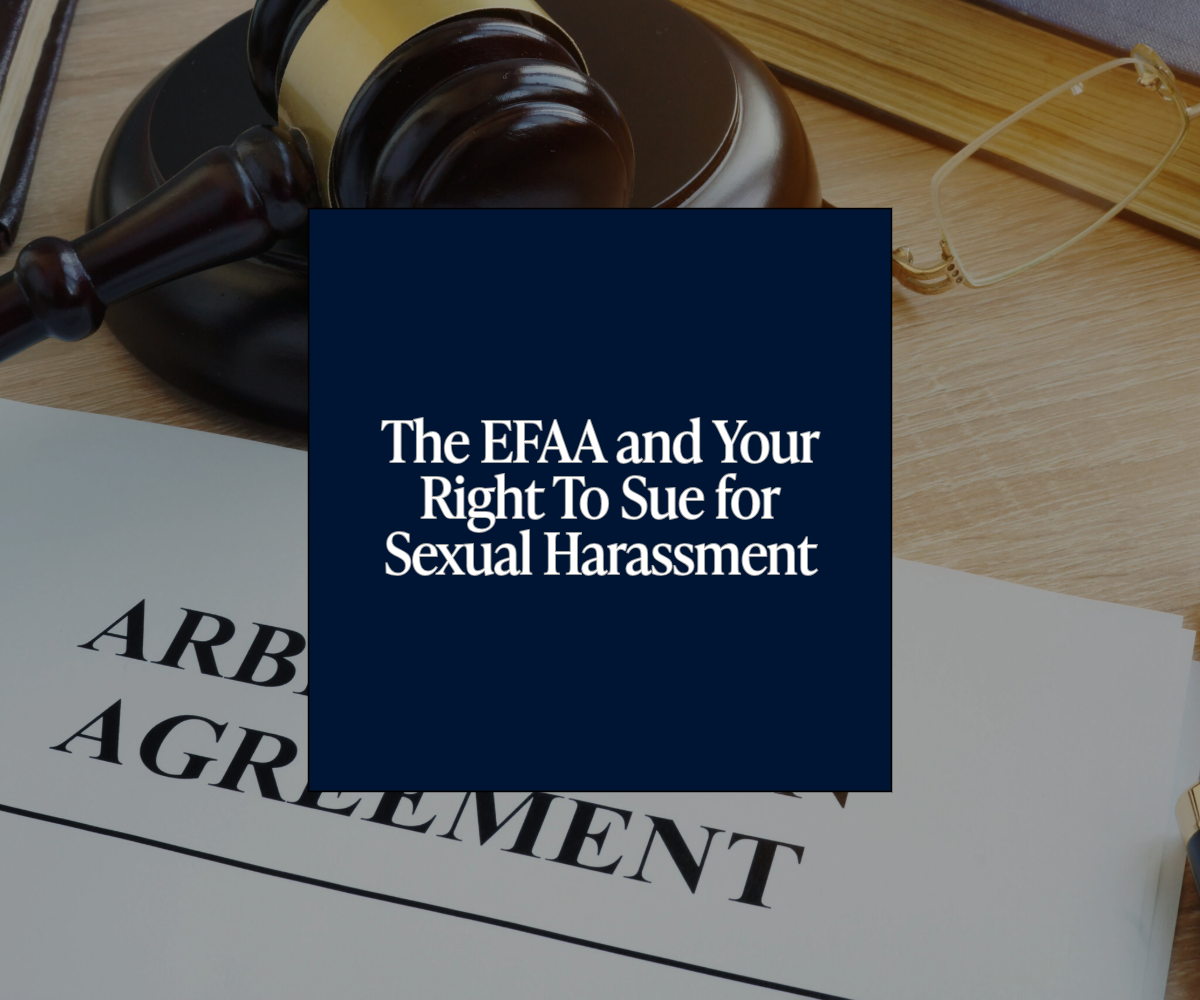The Ending Forced Arbitration of Sexual Assault and Sexual Harassment Act (EFAA), signed into law in March 2022, has transformed how workplace sexual harassment and assault claims are handled in both state and federal courts. The EFAA empowers employees by allowing them to bypass mandatory arbitration clauses, which are often hidden in employment contracts, and instead pursue their claims openly in court.
How the EFAA Changes Workplace Sexual Harassment Claims
Before the EFAA, many employees unknowingly signed employment agreements containing arbitration clauses. These clauses required that all disputes—including those related to sexual harassment or assault—be resolved through private and confidential arbitration. Arbitration often favors employers, as it shields misconduct from public scrutiny and is typically decided by a single arbitrator, such as a lawyer or judge, rather than a jury
With the passage of the EFAA, workers who have experienced sexual harassment or assault now have the option to have their cases heard in open court, giving them access to a jury of their peers. This is a major step toward ensuring greater transparency and fairness in workplace sexual misconduct cases.
Key Protections Under the EFAA
The EFAA offers several important protections for employees facing workplace sexual harassment or assault:
1. Right to Choose a Public Court: The EFAA allows employees to bypass forced arbitration and pursue their claims in court, even if their employment contract includes an arbitration clause.
2. Applies to Sexual Harassment and Assault: The law covers both sexual harassment and sexual assault, giving victims the option to choose the legal venue that best serves their needs.
3. Retroactive Application: One of the most powerful aspects of the EFAA is its retroactive application. Even if you signed an arbitration agreement before the law was passed, you can still take your case to court if the misconduct occurred after March 2022.
Why Avoiding Forced Arbitration is Important
Forced arbitration can place employees at a significant disadvantage for several reasons:
• Limited Discovery: Arbitration typically limits the discovery process, meaning employees have fewer opportunities to gather crucial evidence to support their claims.
• No Jury: In arbitration, disputes are resolved by an individual arbitrator rather than a jury. This removes the chance for everyday people to weigh in on the case, which can be especially important in sensitive cases involving sexual harassment or assault.
• Private Proceedings: Arbitration proceedings are confidential, preventing public accountability and keeping cases out of the spotlight.
• Lower Compensation: Studies show that arbitration often results in lower damage awards for employees compared to cases heard in open court.
By giving employees the option to pursue their claims in court, the EFAA opens the door for greater transparency, public accountability, and potentially higher compensation.
Comprehensive Protection for Related Claims
The EFAA doesn’t just apply to individual claims of sexual harassment or assault—it covers the entire case. This means that related claims, such as retaliation, wrongful termination, or hostile work environment, can also be heard in court. If your sexual harassment claim leads to other negative actions by your employer, such as firing or demotion, those claims can also be litigated publicly rather than being confined to arbitration.
This holistic approach ensures that employees have full access to justice for all harms resulting from workplace misconduct, without being limited to a private process that often favors the employer.
How the EFAA Empowers Employees
The EFAA represents a major shift in employee rights, particularly in the context of sexual harassment and assault cases. For years, mandatory arbitration has been criticized for enabling employers to keep misconduct hidden and avoid public accountability. The EFAA changes this by:
• Offering employees a choice: You now have the power to decide whether to pursue your claim in arbitration or take it to court, based on what’s best for your case.
• Increasing transparency: Court cases are typically part of the public record, which brings greater attention to workplace misconduct and can discourage future violations.
• Giving victims their day in court: For many, having their case heard by a jury is a critical part of the healing and justice process, offering an opportunity for public validation of their experience.
What to Do if You’re Facing Sexual Harassment or Assault
If you’ve experienced sexual harassment or assault at work, it’s important to understand your rights under the EFAA. Even if you previously signed an arbitration agreement, the law now allows you to bypass arbitration and take your claim to court, provided the misconduct occurred after March 2022. This law gives you more control over how your case is handled and ensures that your voice can be heard in a public forum.
Contact a Sexual Harassment Attorney to Protect Your Rights
If you believe your rights under the EFAA are being violated or if you’re unsure about the best course of action for your sexual harassment or assault claim, speaking with an attorney is critical. A lawyer can help you navigate the new legal landscape, ensure that your rights are protected, and guide you in deciding whether to pursue your case in court.
Contact me today for a free consultation about your sexual harassment or assault case.
Request a Free Case Consultation
Employment Law Guidance in for Employees in Florida and Minnesota
Submit Your Case
